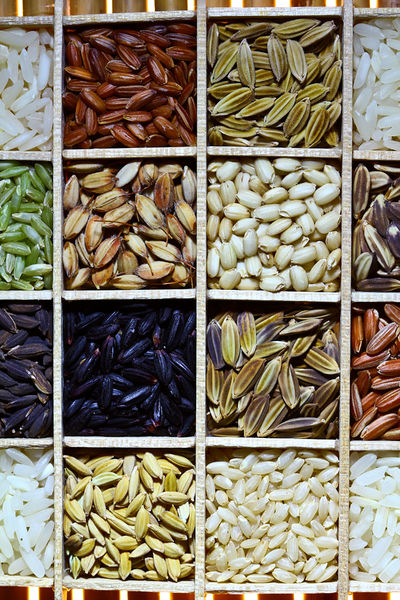Key Difference – HYV Seeds vs Traditional Seeds
Varietal improvement is a common practice among breeders with the objective of developing high yielding crop varieties with improved characteristics such as high grain quality, early maturation, vigor seedlings, better adoption to the environment, stress tolerance etc. Varietal improvement mainly focuses on making high yield varieties to meet the demands of people via sustainable agriculture. High yielding variety seeds (HYV) are the seeds produced by the genetically enhanced high yield varieties. Traditional seeds are the seeds produced by the varieties grown for a long time period without modifying or enhancing the characteristics of the plant. The key difference between HYV seeds and traditional seeds is that HYV seeds produce higher yielding varieties with better quality and environmental adoption while traditional seeds produce lower yielding varieties with normal quality and less environmental tolerance.
Key Takeaways
- High yielding variety seeds (HYV) are the seeds produced by genetically enhanced high yield varieties, while traditional seeds are produced by varieties grown for a long time without modifying or enhancing the characteristics of the plant.
- HYV seeds produce higher yielding varieties with better quality and environmental adoption, whereas traditional seeds produce lower yielding varieties with normal quality and less environmental tolerance.
- The successful cultivation of HYV seeds requires more capital and modern farming tools, while modern tools and technologies are not necessary for traditional farming and capital investment is less in traditional farming.
What are HYV Seeds?
Improving crop varieties with desirable characteristics is a requirement of agriculture in order to fulfill the food need of the population and face the environmental challenges. High yielding varieties (HYV) are novel varieties developed by breeders to obtain economic benefits via improved quality measurements. They are also known as modern varieties. Favorable prominent characteristics of the crop species are selected and bred to modern varieties. Therefore HYVs are known as genetically enhanced varieties.
Development of HYVs initiated during the mid-1960s in Mexico with the efforts of Prof. Norman Borlaug and his associates. The first HYVs were wheat varieties which were early maturing, disease resistant and highly productive. There are several HYVs popular in developing countries such as wheat, rice, maize, etc. The production of HYV varieties to obtain HYV seeds is an expensive process which requires more labor and chemical inputs compared to traditional farming. Several successive cultivations may be needed for the production of the desired HYV seed.
What are Traditional Seeds?
Traditional varieties are the crop varieties grown for a long time period by the farmers. They are not artificially modified. These varieties have good as well as bad characteristics. The cultivation of traditional varieties is becoming less practiced since the high yield varieties are popular among the farmers. Traditional seeds are the products of traditional varieties. They give rise to low or normal quality plants with less tolerance to the environmental challenges and poor yield. Traditional varieties show prominent vegetative growth than high yielding varieties. However, they show poor yield characteristics. Though traditional seeds do not produce high quality plants, they are not subjected to artificial genetic modification. Therefore, it is believed that the use of traditional seeds is safe and has higher health benefits.
What is the difference between HYV Seeds and Traditional Seeds?
HYV Seeds vs Traditional Seeds:
- HYV seeds are better quality seeds while traditional seeds are normal quality seeds.
- HYV seeds are genetically improved seeds, while the genetic makeup of traditional seeds is not modified or enhanced.
- HYV seeds are labor-intensive, whereas traditional seeds are comparatively not labor-intensive.
- HYV seeds require high levels of chemical fertilizers and a good water supply, while traditional seeds require chemicals and water at the normal recommended levels.
- HYV seeds are less prone to pests and diseases, while traditional seeds are more prone to pests and diseases.
- HYV seeds are resistant to flood and drought, while traditional seeds are susceptible to flood and drought.
- HYV seeds give a higher yield per unit area, while traditional seeds give a low yield per unit area.
- Mother plants of HYV seeds are dwarf and stiff strawed, while plants of traditional seeds are not artificially dwarf and stiff strawed.
- Successful cultivation of HYV seeds requires more capital and modern farming tools such as tractors etc., while modern tools and technologies are not necessary for traditional farming and capital investment is less in traditional farming.
Summary – HYV Seeds vs Traditional Seeds
HYV seeds are genetically enhanced seeds for higher yield. They result in high-quality plants with good characteristics. Traditional seeds are natural seed produced from the plants grown for a long period of time without modifications of the characteristics. This is the difference between HYV seeds and traditional seeds.
